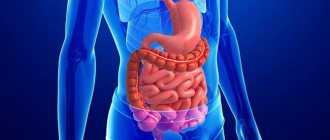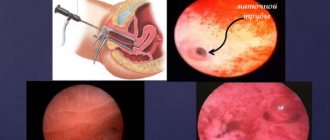Despite the fact that this period is often accompanied by discomfort, it is an indicator of hormonal balance in the female body.
Factors influencing well-being before menstruation
Symptoms of approaching menstruation in girls are noticeable even a year before the onset of bleeding. Signs of approaching menstruation in girls are listed in the table below.
| Approximately several years before the onset of menstruation. | In a few months. | Signs that appear a week or several days before the event. |
| Enlargement (swelling) of the breast. | Transparent, white or yellowish discharge on panties that has no odor. If the discharge that appears is of a different color or has an unpleasant odor, you should consult a gynecologist. | Tearfulness. |
| The appearance of hair in intimate places. | Apathy. | |
| Expansion of the hips. | Mood changes. | |
| Some girls experience acne on the skin of their face. | Headache. | |
| Aggression. | ||
| Pain in the lower abdomen. |
Typically, girls have their first period at the age of 12–13 years. However, due to physiological characteristics, this moment can come either earlier or later. The norm for their onset is 10–16 years. Otherwise, it is recommended to visit a gynecologist.
When your period starts depends on genetics
The onset of menstruation is influenced by a large number of factors, including:
- physical development;
- past pathologies;
- hereditary factor;
- accommodations;
- nutrition.
There are girls who are far ahead of their peers in their physical development. In this case, your period may begin earlier than expected, which is a normal situation. Genetics also plays a big role.
As already noted, menstruation in girls occurs between the ages of 10 and 16 years. Its appearance is influenced by many factors. In case of an incorrect lifestyle, menstruation may begin either earlier or much later than expected.
Girls should have plenty of vitamin D in their diet.
If there are hormonal imbalances, poor nutrition, excess weight or constant fluctuations (obesity, then sudden weight loss), a girl may experience early menstruation. Vitamin D is of great importance for a teenager's body. With its deficiency, girls often experience the onset of menstruation before the age of 9 years.
Teenagers who have suffered from infectious diseases often experience problems with the functioning of the ovaries and the endometrium. In this case, menstruation may begin later than expected. Other factors may also contribute to this problem, for example:
- exhausting diets (fasting);
- constant stress;
- hard, exhausting workouts;
- overweight or underweight;
- unfavorable environment.
Bleeding often occurs later in short and excessively thin girls. With low weight, the girl’s body does not have enough adipose tissue, and estrogen (sex hormone) ceases to be produced in sufficient quantities.
Very thin girls may have problems with the onset of menstruation.
The first bleeding for a girl is a very difficult situation. Unpleasant, unusual sensations and the need to change the pad several times a day torment the teenager. During the period from the first to the third day, the heaviest bleeding occurs, which has a specific smell. During this period, we must not forget about personal hygiene, not only because of the “aroma,” but also because this can lead to inflammation of the genitourinary system.
From the third to fourth day, the amount of blood released decreases, the pain goes away, and the girl begins to feel much better. In this regard, you need to learn to determine when the first day of your period will arrive.
Puberty in girls begins at 11-14 years of age. After menarche has occurred, that is, menstruation has begun for the first time, it may take 1.5-2 years until hormonal levels are completely established and the menstrual cycle is normalized. The onset of the first menstruation in girls can be determined by specific signs that appear several years before their arrival. 1.5-2 years before this, the girl develops a whitish or yellow secretion, the intensity of which intensifies shortly before the regulation.
A nagging pain may occur in the ovaries, which is provoked by their growth and stretching. In this case, the signs of PMS appear weakly, but if there are deviations from the norm, the signs of the syndrome in girls may coincide with the symptoms of adult women.
Each woman has completely different symptoms before menstruation: as a rule, breast swelling, pain in the lower abdomen above the pubis, brown spotting, irritability, short temper, a voracious appetite, etc.
Approximately 45% of women experience the appearance of PMS; the older they are, the more severe the symptoms. As a rule, signs appear 10 days before the start of menstruation.
Women report fatigue, general malaise, vomiting, depression and aggression.
Although the symptoms of the onset of menstruation may be different for all women, there are many common signs.
The first signs of the onset of menstruation in women, what are they:
- feeling depressed and tearful;
- anxiety;
- aggression;
- hopelessness;
- headache;
- malaise;
- a great desire not to see anyone;
- absent-mindedness, it is impossible to concentrate and concentrate;
- increased appetite;
- excessive sleepiness;
- insomnia;
- flatulence
- the appearance of swelling;
- The breasts become sensitive and pain is felt in the mammary glands.
As a rule, several symptoms occur simultaneously. If the signs before menstruation cause a lot of discomfort, you need to visit a doctor who will prescribe appropriate therapy. It is worth understanding in detail all the signs of the onset of critical days.
Extra pounds are a sore subject for every woman. Before the start of menstruation, you should expect an increased feeling of hunger and really want to eat. Of course, the same female hormones are to blame. During this period, the body is deficient in serotonin, the hormone of joy.
In order for all processes to return to normal, a lot of carbohydrates are needed, which is why the feeling of hunger appears. To avoid gaining weight, you need qualified help from a nutritionist and endocrinologist. The principle of the diet is to eat small portions, often. Drink more water, eat fresh fruits and vegetables, as well as dairy products.
A week before the start of menstruation, many women experience acne on their facial skin. This symptom is considered individual, but the frequency of its manifestation is 95%.
The cause of vomiting is the increased level of female hormones during this period. Vomiting often worsens when taking birth control medications. This may indicate that the product was chosen incorrectly.
Nausea can also occur due to the design of the uterus. Before menstruation, it increases and puts pressure on the nerve centers, which provoke vomiting.
Headache
After the ovulation phase, the body begins to prepare for conception, and a decrease in progesterone is noted. If fertilization does not occur, menstruation begins. A large number of women do not notice that they have a headache.
More sensitive ladies complain about such signs. The water-salt balance deserves attention; if it is abnormal, it can cause headaches. Separate attention should be paid to the development of depression.
This sign is a common occurrence. Sometimes emptying may be accompanied by pain in the urinary canal. A deviation is considered to be if a woman urinates more than 10 times a day.
Frequent urge to defecate can be caused by hormonal imbalance, formations in the bladder, stones in the urinary tract, neuroses, diabetes, uterine prolapse and fibroids.
But if you constantly want “small”, you may have cystitis. This is a bladder disease.
If the urge appears only a week before your period, this is a signal that menstruation will begin soon.
Feelings of approaching menstruation begin during the ovulation phase. This is due to the presence of a slight hormonal imbalance in the body. Most common symptoms:
- Changes in mood. Irritability appears, some women, on the contrary, become whiny and fragile. As you approach menstruation, these symptoms become more severe.
- Another harbinger is a change in taste preferences. Just yesterday you went to the gym and didn’t allow yourself an extra piece of bread, but today you suddenly wanted cakes and chocolate? Don't be so quick to blame willpower.
- Abdominal pain caused by ovarian activity. Discomfort is felt a week before the start of the cycle and often becomes a companion to menstruation in the first 2 days. A warm shower or any antispasmodic will help relieve pain.
- Slight increase in basal body temperature. During and after ovulation, body temperature can rise to 37.2-37.4 ° C, these are common signs before menstruation. In this case, no symptoms of a cold or other disease are felt. A temperature above 37.5 °C is not normal, so you should consult a doctor.
- If menstruation does not start on time (a delay of up to 5 days is normal), a woman may feel lethargic and nauseated. Such signs of menstruation resemble pregnancy, which occurs due to hormonal imbalances.
Most women cannot avoid unpleasant symptoms before menstruation. However, it is quite possible to ensure that the warning signs of menstruation are kept to a minimum. Factors that influence a woman’s well-being during PMS:
- Diet. Menstruation aggravates problems with the gastrointestinal tract, so some women report pain, bloating, and flatulence. You can avoid this by normalizing your eating habits. Avoid foods that are harmful and aggressive to the stomach. Give preference to foods rich in vitamins and microelements.
- Fitness level. It has been proven that if a woman’s body is in good shape, menstruation is easier. Just don't overdo it with loads. Without appropriate preparation, they can damage the body and cause a complete absence of menstruation (amenorrhea).
- Having bad habits. Large amounts of coffee, cigarettes and alcohol not only cause damage to the body, but also provoke pain during PMS.
- Psychological condition. Women with a normal psychological background can more easily endure any disruptions. One of the keys to mild PMS is creating a normal atmosphere at home and at work.
- The presence of diseases of the genitourinary system. All pathological processes must be treated in a timely manner, avoiding the occurrence of complications or the arrival of menstruation.
Before the onset of menstruation, each woman experiences completely different symptoms, often including brown spotting, pain in the lower abdomen, breast swelling, strong appetite, short temper and irritability. Almost 50% of all representatives of the fairer sex experience the occurrence of PMS, and with age they become more pronounced. The first signs can be observed a week before the expected period.
The following article lists in detail the sensations and signs before menstruation, the main symptoms before the onset of menstruation, when the first symptoms of menstruation appear and answers to many other questions.
- a couple of years before the first monthly discharge, girls may experience the appearance of leucorrhoea, clear or white discharge, and before the start of real menstruation, leucorrhoea may become more profuse;
- the appearance of pain in the lower abdomen, may be mild or, on the contrary, quite pronounced, sometimes requiring the use of painkillers in order to lead a normal life;
- a symptom of PMS, which will be expressed in a bad mood, irritability or lethargy and weakness of the body. It may not be as pronounced as in mature women, but it already takes place in the lives of girls.
Premenstrual syndrome
Even in ancient times, scientists and doctors noted connections between the approach of menstrual periods and a woman’s poor health. Today, such ailments have received their own name - premenstrual syndrome.
In women of the reproductive period, manifestations of the syndrome occur in approximately 25% of cases, while in more mature women this figure reaches approximately 50%.
The causes and etiology of this syndrome still remains a mystery, shrouded in many theories and conjectures. The most popular versions of the appearance of symptoms, defined as harbingers of menstruation, are the influence of hormonal and psychosomatic factors.
Women at risk for PMS include:
- living in large cities with polluted ecology;
- exposed to severe stress at work or at home;
- having chronic diseases of the reproductive or endocrine system;
- experiencing miscarriages or abortions;
- prone to depression;
- with low physical activity.
The manifestation of PMS largely depends on a woman’s predisposition to psychological, autonomic, metabolic or endocrine abnormalities. The symptoms of this syndrome are characterized by cyclicality, which suggests its connection with the menstrual cycle. It is impossible to say exactly how many days before your period PMS symptoms will occur. For some women, symptoms appear one or two days before bleeding begins, for others about a week.
Often the first signs of PMS appear in girls before menarche. And at the same time as the sequence of the menstrual cycle is established, a certain pattern of symptoms of premenstrual syndrome is observed. However, the syndrome develops differently in all women. For some, symptoms become more severe with age, for others, on the contrary, they practically go away after puberty. There are also women who experience signs of PMS after their period ends.
By determining the individual sequence and symptoms of premenstrual syndrome, you can determine how many days are left before the onset of menstruation.
The only difficulty is that such manifestations may be similar to those of pregnancy and the onset of menopause. If there is a possibility of such phenomena, they can only be distinguished from premenstrual syndrome by the method of exclusion.
What is the menstrual cycle
The ratio of sex hormones (estrogens and progesterone) produced in the ovaries fluctuates throughout the menstrual cycle. It is these fluctuations that provoke changes in overall hormonal levels.
After ovulation has passed, the second part of the cycle begins - the luteal phase, which precedes the onset of menstruation. Preparation for this period of the cycle begins in advance. Under the influence of hormones, the condition of the breasts and genitals changes. The central nervous system and brain are influenced by hormonal processes.
The following factors may influence the intensification of PMS symptoms:
- gynecological and chronic diseases;
- improper work schedule, including night shifts;
- influence of harmful substances;
- lack of sleep;
- unbalanced nutrition;
- stressful situations, conflicts.
The second phase of the cycle begins on the first day of ovulation. At this moment, the egg is released from the ovarian follicle. It is impossible to name the exact date of transition to this phase. It directly depends on the individual characteristics of the body, but normally the process occurs from the 7th to the 22nd day of the cycle.
At the time of egg release and after ovulation, women may experience the following symptoms:
- slight bleeding;
- general deterioration of health, fatigue, feeling of nausea;
- nagging pain in the lower abdomen.
Such unpleasant sensations before menstruation are considered normal and do not indicate the development of pathology. Once a woman's cycle is established, the second phase becomes completely predictable. It lasts between 13–15 days. The countdown begins from the moment of ovulation and ends when menstruation occurs.
About a day before the onset of menstruation, pain appears in the back, legs and lower abdomen. Muscle weakness and lack of strength are observed. Sometimes, within a few days, signs of the onset of menstruation appear, such as headache, dizziness, diarrhea and nausea. Women may even lose consciousness before their period begins.
The menstrual cycle is periodic hormonal changes associated with the characteristics of the female body. Thanks to it, the body prepares for fertilization. The duration of this period is different for everyone.
Every woman’s cycle should be regular; deviations of only three days are allowed. Therefore, doctors recommend that women mark the first day of menstruation on the calendar. You should know that during the first year the menstrual cycle may not be constant. The intervals between bleeding can be up to two or even more months.
The normal duration of monthly bleeding is from two to seven days. During one menstruation, a woman loses on average about 40 ml of blood, some up to 80 ml. The menstrual cycle begins during adolescence and continues until a woman reaches menopause.
During your first period, bleeding is usually not very intense.
The normal cycle of a healthy woman ranges from 21 to 30 days. The day from which it is counted is the first day of menstruation. The cycle is controlled by female sex hormones. Period symptoms appear before the next cycle begins. The cycle is divided into 3 phases:
- follicular;
- ovulatory;
- luteal
The first phase should begin along with menstruation and lasts until approximately the middle of the cycle. Many people believe that it is impossible to get pregnant during this phase. This statement has a basis, but women should not believe it 100%. Several dozen pregnancies occur during this time. During this phase, the chances of pregnancy are low. Follicles form in a woman's ovaries, from which eggs are later released.
The hormone estrogen is “responsible” for the normal course of the first phase. Its release increases, which causes thickening and growth of the endometrium. Feelings of “swelling” in the abdomen are one of the symptoms of an early period. Estrogen production reaches its peak towards the middle of the cycle. 2-3 days before “day X” the concentration of the hormone approaches its maximum. The follicle then bursts and an egg emerges, ready for fertilization. Ovulation occurs.
Ovulation is not asymptomatic for everyone. About 15% of women experience discomfort. This is the norm. However, severe pain may indicate inflammation or an ectopic pregnancy. There are cases when ovulation was mistaken for an attack of acute appendicitis, and only a thorough diagnosis helped to understand why the woman was experiencing severe pain. Many women notice a slight increase in body temperature during ovulation until the start of the cycle.
The final phase of the cycle is the luteal phase. The hormone progesterone comes into action. Due to it and estrogen, the follicle becomes a corpus luteum. The endometrium becomes even thicker, lining the epithelium for the attachment of the future fetus. What happens next depends on the pregnancy:
- If this happens, the baby is attached to the uterus and ends up in the place prepared for him. Here the placenta is formed, and the development of the embryo and then the fetus occurs.
- If there is no pregnancy, the body begins to reject the epithelium, and menstruation begins. The cells of the lining layer come out of the vagina in the form of bloody discharge.
Nausea before menstruation
Pre-period signs also include feeling nauseous. Nausea is caused by elevated hormone levels. The feeling of nausea often increases when taking hormonal contraceptives. This may be due to the choice of an inappropriate contraceptive and a different drug should be chosen.
It may also cause nausea due to the structure of the uterus. Before menstruation, an enlarged uterus can put pressure on the nerve centers, which cause a feeling of nausea. Nausea before menstruation can occur in women who engage in excessive physical activity.
What happens to the ovaries before menstruation
Puberty occurs after luteinizing and follicle-stimulating hormones begin to be produced in the hypothalamus and pituitary gland. Thanks to them, the formation of estrogen begins in the ovaries. At the same time, significant changes occur in the reproductive system. Oocytes mature and ovulate, and the endometrium develops. This leads to the possibility of conception. The quantitative content of hormones, which is inherent in the menstrual cycles, begins to change.
For the first time there may be pain in the ovaries
At the same time, both during and during menstruation, the ovaries are able to remind themselves with unusual sensations. During these periods of time, nagging pain may appear. However, they should not be very pronounced and long-lasting. Otherwise, when the pain is quite severe, it is necessary to contact a gynecologist, as they may indicate pathology.
If conception does not occur, then menstruation occurs. The egg cell degrades and disintegrates. One of its parts is called the corpus luteum, which produces progesterone. This substance is necessary for the future cycle. When this hormone is not produced enough, partial separation of the endometrium occurs.
Increased appetite before menstruation
Gaining excess weight scares most of the fairer sex, and before menstruation the feeling of hunger usually increases.
Of course, the reason for appetite lies in hormonal changes. There is a lack of serotonin in the body. To normalize processes in the body, a lot of carbohydrates are required, which is why hunger occurs.
How to avoid gaining unwanted pounds? In this case, advice from nutritionists and endocrinologists will help. Also, you should not endure hunger, because... the body needs nutrients. It is better to eat portions and in small quantities. You should drink a lot of water, and add more vegetables, fruits, and dairy products to your diet.
What signs indicate pregnancy?
Before menstruation, the breasts swell, tearfulness appears, and you feel sick from your favorite foods. Some even see the coveted stripes on the test. All this does not mean that your period will not come on time.
Delay is also one of the signs of pregnancy. However, a delay can sometimes indicate a hormonal imbalance. Thus, some athletes or novice vegetarians report severe disruptions at the beginning of the cycle. The reason to contact a gynecologist is a cycle failure for more than 5 days. In this case, the doctor will either confirm the pregnancy or inform you about the need to adjust your hormonal levels.
A reliable sign of pregnancy is the release of a large amount of hCG into the blood. This is a specific hormone present in the female body throughout the entire period of gestation. Pregnancy is determined by its concentration in urine or blood. A blood test gives more reliable results and allows you to determine the “interesting position” almost from the first week after fertilization. Toxicosis begins later.
When pregnancy occurs, many women begin to feel various symptoms of this change in the body even before their period is missed. These symptoms are very similar to regular PMS:
- Nagging pain in the abdomen;
- Enlargement and swelling in the chest, its pain;
- Drowsiness, weakness, lethargy, lethargy;
- Quick mood changes;
- Nausea and vomiting.
Therefore, with such symptoms, it is very difficult to determine that fertilization has occurred. You must either wait for the delay in your period and do a test on the second day, which will show a positive result - two stripes during pregnancy, or a negative result - one strip, without waiting for the delay, donate blood for a hCG test, which can determine pregnancy already 5-7 days after conception.
It is better to do the test twice for reliability and it is recommended not to do it on the first day of the delay, since the level of hCG hormones may not yet reach the desired level in the urine and the result during pregnancy will show a negative version, not a positive one.
It is advisable to find out about pregnancy as early as possible in order to prepare your body for pregnancy, start eating right, get more rest, don’t overwork, quit bad habits if you have them, take vitamins, walk in the fresh air, avoid taking medications that can harm the fetus . All this will help you bear a healthy baby. And of course, women who want to get pregnant, but who have not yet been able to do so, want to find out about the joyful event much earlier. But in this case, it is better to rely on the hCG analysis or test, since with a strong desire, symptoms of a “false pregnancy” arise, and if the result is negative, the woman begins to worry even more and can become depressed and withdraw into herself.
Based on the above, we can say that symptoms of the onset of upcoming menstrual flow occur in almost every woman; they may differ in the severity of symptoms, but in general they are similar sensations that can sometimes be confused with pregnancy.
Therefore, it is very important to monitor your menstrual cycle and monitor all changes in it. If there are deviations from the norm or severe pain occurs, it is better to consult a specialist to rule out any pathology in the body or begin timely treatment. You shouldn’t hesitate or put off visiting a doctor until later; our health depends largely on ourselves.
Differences
Why do some symptoms of early pregnancy and premenstrual syndrome coincide? In the first case, in both cases there is a hormonal change in the body. The hormonal background begins to change little by little in the first hours after fertilization has occurred.
The changes occurring in the mammary glands are very revealing. The breasts become very sensitive and increase slightly in size. In some cases, touching them can be extremely painful.
Cramps and pain in the lower abdomen may also be present during pregnancy. Some women experience morning sickness very quickly. During pregnancy, the urge to urinate may become more frequent. But the same symptom is also observed with cystitis, so it must be taken into account, but only if other signs of pregnancy are present.
Another characteristic sign of pregnancy is an increased sense of smell. Many odors that were previously undetectable become more intense and lose their appeal.
This change can be easily seen in the example of perfume. If previously your favorite subtle perfume aroma evoked only positive emotions, then with the onset of pregnancy it can become very strong. The hormone estrogen is responsible for enhancing the sense of smell. At this time, it is present in large quantities in the blood.
When to see a doctor
When the first “critical days” appear, it is not necessary to regularly consult a gynecologist. People usually have their first appointment with this doctor at age 15. If a girl has had early sexual experience, then visits to the gynecologist should be regular.
You should consult a doctor if you have the following symptoms:
- unpleasant odor of discharge, itching;
- heavy bleeding;
- the duration of menstruation is one or more than seven days;
- breaks between menstruation in the first year for more than three months;
- irregular menstrual cycle;
- the presence of large, grape-like blood clots.
If menstruation does not begin at the age of 15–16 years, you should contact a gynecologist and take possible measures for its occurrence.
It's all due to hormones
Signs of approaching menstruation cannot be imagined without a disrupted amount of hormones.
The levels of estrogen and progesterone change during periods of hormonal instability. As mentioned earlier, pain can occur a few days before menstruation, or 1-2 weeks, which last until the end of menstruation.
Of course, a year after the start of menstruation, the signs become mild. But if there are any suspicious changes in your cycle, you should go to the doctor, because... they can become the first signs of illness. It should be noted that after childbirth, the signs of menstruation become completely invisible.
What symptoms before menstruation can be considered signs of health problems?
Normally, before the onset of menstruation, white discharge is observed, which cannot be considered a pathology. If there is heavy spotting before your critical days, this may indicate the presence of a pathology, which is recommended to be shown to a doctor:
- If vaginal discharge is white and flake-like in structure, this indicates the presence of thrush. If treatment is started in a timely manner, the problem quickly goes away;
- If you have recently given birth, as a result of which the cycle has not had time to establish itself, some women experience black spotting. There is nothing wrong with this, don’t be afraid;
- Pink discharge, similar to ichor, indicates possible erosion of the cervix. In addition, they may indicate infectious diseases and endocerceritis;
- Brown spotting before menstruation indicates the presence of a hormone imbalance and the onset of endometriosis, in which case it is recommended to consult a gynecologist for testing;
- The greatest danger lies in yellowish-green discharge with a mucous texture, indicating the presence of purulent cervicitis.
Of course, such phenomena are often random in nature, without causing harm to health. However, in any case, it is recommended to see a doctor to make an accurate diagnosis.
What if you have symptoms but no periods?
There are situations when women experience the first signs a week before the start of menstruation, but still don’t have their periods. This situation may indicate pregnancy. But even before the expected menstruation begins, the test is unlikely to clarify anything. The hCG level at this stage of pregnancy is too low. Only a blood test for the level of “pregnancy hormone” can accurately determine pregnancy.
If the delay is long, you need to do a test, and if it is negative, you need to immediately visit a gynecologist.
The problem and causes can be different: diseases, metabolic disorders, stress, hormone imbalance, etc.
In any case, if there are all the signs that your period is about to start, but it doesn’t, you should be wary. It is not a fact that this is a dangerous disease or pathology, but it is still worth contacting a gynecologist for advice.
Why erroneous symptoms appear:
- Often, pain before menstruation can occur if a woman has been diagnosed with an ovarian cyst.
- Symptoms such as before menstruation may occur with endometriosis, a progressive adhesive disease.
- Pain that a girl mistakenly perceives as signs of menstruation is called acyclic and may not be associated with menstruation.
- Another possible reason, when a week before menstruation all the signs of the oncoming period appear, even spotting may begin, is an ectopic pregnancy. This pregnancy is “wrong” and it is very dangerous for the woman’s life, so you need to visit the gynecologist on time.
What measures to take when there are signs of imminent menstruation, but your period does not begin? Contact a doctor who will prescribe effective treatment. With amenorrhea, all premenstrual symptoms may persist, but menstruation is completely absent. And this condition can last up to six months.
PMS
All of the above symptoms are collected under one name - premenstrual syndrome. This diagnosis is not a pathology - it is the extreme limit of the normal functioning of the female reproductive system. The exception is the critical form of PMS. Signs of this pathology are severe headaches, accompanied by surges in blood pressure, loss of consciousness, shortness of breath and fear of death, and dyspepsia. This form of PMS requires urgent medical treatment, since women after such attacks become panicky about the onset of their period.
PMS forms
Doctors distinguish 4 forms of PMS that require medical supervision:
- Neuropsychic;
- Cephalgic;
- Edema;
- Critical.
Treatment of unpleasant symptoms before menstruation
After contacting a gynecologist, the doctor will conduct an examination and prescribe a set of diagnostic measures. Often, to treat PMS, it is enough to change a woman’s usual lifestyle:
- proper nutrition;
- practicing feasible sports;
- sufficient water intake;
- taking vitamin and mineral complexes;
- psychological support for loved ones.
In particularly advanced situations, medications may be used to eliminate premenstrual syndrome. The homeopathic medicine Remens and Mastodinon have proven themselves well, they normalize the hormonal levels of the female body, eliminate the symptoms of PMS, and also produce a slight calming effect.
To relieve nervous tension, it is advisable to take a course of sedatives of herbal origin 10-12 days before the planned menstruation. Valerian, Novo-pasit, Sedavit. To normalize ovarian function, gynecologists use vitamin E 400 mg, which effectively relieves PMS symptoms by normalizing the endocrine function of the ovaries. To relieve pain, painkillers are used: Ibuprofen, No-shpa, Tamipul, Analgin, Tempalgin, Spazmalgon. The choice of drugs to eliminate symptoms of the premenstrual period should be made by the leading gynecologist. Self-medication in this situation is unacceptable.









